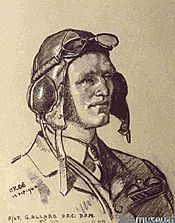Geoffrey Allard facts for kids
Quick facts for kids
Geoffrey Allard
|
|
|---|---|

Geoffrey Allard by Cuthbert Orde, 1940.
|
|
| Nickname(s) | Sammy |
| Born | 12 August 1912 Strensall, Yorkshire, England |
| Died | 13 March 1941 (aged 28) Wimbish, Essex, England |
| Buried |
Saffron Walden Cemetery
|
| Allegiance | United Kingdom |
| Service/ |
Royal Air Force |
| Years of service | 1929–1941 |
| Rank | Flight Lieutenant |
| Service number | 44551 |
| Unit | No. 87 Squadron RAF No. 85 Squadron RAF |
| Battles/wars | World War II |
| Awards | Distinguished Flying Cross Distinguished Flying Medal & Bar |
Flight Lieutenant Geoffrey "Sammy" Allard was a brave pilot from the Royal Air Force (RAF) during the Second World War. He was known as a "flying ace," which means he shot down many enemy aircraft. Allard achieved 19 victories against enemy planes. He also shared in five other victories and had two more probable kills. He was recognized for his courage with the Distinguished Flying Cross (DFC) and the Distinguished Flying Medal (DFM) with a Bar.
Contents
Early Life and RAF Training
Geoffrey Allard was born in Strensall, Yorkshire, on August 12, 1912. His parents were Sydney Harold and Elizabeth Allard. When he was 17, in 1929, he joined the RAF.
He started his career as a mechanic, learning important skills at RAF Halton. In 1936, he decided he wanted to fly planes. He trained to become a pilot and joined No. 87 Squadron RAF in 1937. That same year, he married Kathleen Minnie Ross in York. In June 1938, he moved to No. 85 Squadron RAF.
Flying in World War II
Allard flew the fast Hawker Hurricane fighter plane. He first saw action during the Battle of France. Here, he shot down about eight enemy aircraft. He was a very skilled pilot.
In August 1940, he was promoted to flight sergeant. Soon after, he became an acting flight lieutenant. He took charge of 'A' flight in his squadron. He continued to show great bravery.
During the intense Battle of Britain, Allard scored eight more kills. These victories happened between August 24 and September 1, 1940. His bravery was noticed by Fighter Command. A famous artist, Cuthbert Orde, even drew his portrait. This happened on the same day he received a second Distinguished Flying Medal.
In October, his squadron changed its role. They became a night-fighter unit. This meant they flew missions at night to find and fight enemy planes. Allard was awarded the Distinguished Flying Cross (DFC) that same month for his outstanding courage. On December 6, 1940, he was promoted again to flying officer.
Final Flight and Legacy
On March 13, 1941, Allard was on a flight with two other pilots. They were Pilot Officer Francis "Frank" Walker-Smith and New Zealand ace Pilot Officer William Hodgson. They were flying to pick up a new type of plane. Sadly, during the flight, a part of their aircraft came loose. This caused the plane to crash near Wimbish, and all three pilots died.
Allard, Walker-Smith, and Hodgson had all fought together. They were part of the British forces in France in early 1940. All three were also successful pilots during the Battle of Britain. Geoffrey Allard is buried with Hodgson and Walker-Smith at the Saffron Walden Cemetery.
Honours and Remembrance
Geoffrey Allard received several important awards for his bravery.
- On September 13, 1940, he was awarded a Bar to his Distinguished Flying Medal. This meant he received the medal a second time.
- On October 8, 1940, he was awarded the Distinguished Flying Cross (DFC). This award recognized his amazing skill and courage in fighting the enemy. Between August 30 and September 1, 1940, he destroyed seven enemy aircraft. He had already destroyed ten before that.
People still remember Geoffrey Allard today. On March 12, 2011, a special event was held. It marked 70 years since his death. Relatives and friends of Allard, Hodgson, and Walker-Smith met at RAF Debden. There was a display by a Supermarine Spitfire plane. A memorial service was held in Wimbish Church.
On March 13, 2011, wreaths were laid on their graves in Saffron Walden. A road in the town was officially named "Allard Way" in his honor. Another street, Allard Crescent in Bushey, is also named after him. It is one of many streets in that area named after the brave pilots of the Battle of Britain.
 | James Van Der Zee |
 | Alma Thomas |
 | Ellis Wilson |
 | Margaret Taylor-Burroughs |

